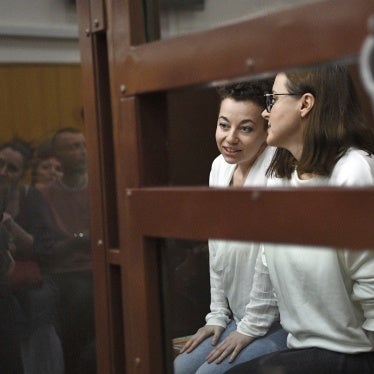It is not just in the United States that aggressive counterterrorism measures have raised serious human rights concerns. This month, the UK House of Lords began debating a draft counterterrorism law that would institute a number of harmful proposals, including granting police the power to detain terrorism suspects for up to six weeks without charge.
Much of the debate around the bill so far has focused on the British government’s effort to extend pre-charge detention beyond the already-excessive 28-day period allowed under existing law. But the bill contains other worrying provisions as well.
In a briefing paper issued earlier this month, Human Rights Watch analyzed the draft law, focusing on those provisions that it believes are incompatible with Britain's human rights obligations. As Human Rights Watch emphasizes, counterterrorism measures that violate human rights undermine a government’s moral legitimacy and damage its ability to win the battle for “hearts and minds” – a battle that U.K. Prime Minister Gordon Brown has acknowledged to be central to long-term success in countering terrorism.
Pre-Charge Detention
Human rights groups believe that the 28-day pre-charge detention period allowed under existing law should be rolled back rather than extended. Surprisingly, perhaps, their opposition to the proposed extension is echoed by a number of conservative political figures, including the former head of MI5, the U.K. intelligence agency. In her maiden speech to the House of Lords, former MI5 director Baroness Manningham-Buller argued strongly against the proposal. She emphasized that she disagreed with the government's plan on a “practical basis as well as a principled one.”
Others authorities who have criticized the planned extension include current Director of Public Prosecution Sir Ken MacDonald, former Justice Minister Lord Falconer, and former Attorney General Lord Goldsmith. Faced with such criticisms, the government had offered a few concessions meant to improve pre-charge detention safeguards.
But the most important safeguard – robust judicial scrutiny to prevent arbitrary detention – remains wholly inadequate. The senior judge reviewing extended detention under the bill does not assess whether there are reasonable grounds to believe the person who is detained committed a terrorist offense, the ultimate issue at stake in considering whether detention is lawful or not.
In addition, the 42-day detention power, when authorized by the home secretary, is valid for 30 days, down from the two months originally envisioned. But after 30 days, the home secretary can immediately reauthorize a new extension (subject to subsequent approval by Parliament), raising the possibility of rolling 42-day periods of pre-charge detention.
This power only exists when the home secretary invokes an “exceptionally grave terrorist threat.” But the formulation is open to wide interpretation, not least because it covers attacks that are planned or executed anywhere in the world. And although Parliament needs to approve the power within seven days of the home secretary initially authorizing it, the legislature is ill-equipped to scrutinize individual detention decisions, a function that is best performed by the courts.
How to Remedy the Bill's Problems
The Human Rights Watch briefing paper outlines several other key problems with the proposed legislation:
- The bill allows post-charge questioning without effective safeguards against self-incrimination and oppressive police interviews. It allows the courts to draw negative inferences during terrorism trials when the defendant exercises the right to remain silent after being charged, and it fails to require explicitly the presence of a lawyer at all times when a defendant is questioned once charged.
- The bill gives the government the power to order, on the grounds of national security, that an inquest into a person’s death be held in secret and without a jury.
- The bill expands the U.K.’s already overbroad definition of terrorism.
The briefing paper also contains concrete recommendations to the House of Lords for how to remedy the bill's problems. It urges the Lords to:
- Reject the power to extend pre-charge detention to 42 days;
- Improve safeguards for current 28-day pre-charge detention, until it is repealed, including the requirement that any judge authorizing extensions to detention be satisfied that reasonable grounds exist to believe the detainee has committed a terrorist offense;
- Reject the proposal to allow adverse inferences to be drawn in post-charge questioning, and an explicit requirement that a lawyer be present all times; and
- Narrow the definition of terrorism.
As Human Rights Watch emphasizes, the third anniversary of the 2005 London bombings is a reminder that Britain faces a real terror threat. But passing dangerous and unnecessary proposals like those contained in the draft law will not improve the country's security. The Lords should take a principled stand against the proposed legislation.








